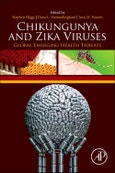Chikungunya and Zika Viruses: Global Emerging Health Threats is the go-to resource for both historical and current information on this important virus that is rapidly increasing its global range. Epidemics since 2005 have spread from Africa and Asia, and through Europe, and an ongoing epidemic has caused nearly two million cases in the Americas. It causes severe crippling arthritis, with symptoms lasting for months or years. As no vaccine or treatment is available, there is international interest in the virus, thus funding opportunities for research have dramatically increased. This book presents our understanding of the virus, bringing comprehensive knowledge in a single source.
Please Note: This is an On Demand product, delivery may take up to 11 working days after payment has been received.
Table of Contents
1. History of Chikungunya 2. Transmission Cycle 3. Human Diseases 4. Chikv in Africa 5. Chikv in Asia 6. Chikv in Europe 7. Chikv in Americas 8. Chikv Genetics 9. Diagnostics and Laboratory Techniques 10. Animal Models 11. Vaccine Candidates 12. The Future
Authors
Stephen Higgs Associate Vice President for Research, Kansas State Univeristy; Research Director, Biosecurity Research Institute (BRI), Peine Professor of Biosecurity, Univeristy Distinguished Professor, Diagnostic Medicine & Pathobiology, Kansas USA.His research on chikungunya virus (CHIKV) preceded the ongoing epidemics that have recently infected over 1M people in the Americas. His development of patented infectious clones of this CHIKV placed his group at the forefront of research on this virus. They have distributed these research tools to other groups in an effort to better understand the epidemic. They have published over 30 papers on many aspects of chikungunya with collaborators from multiple institutes in different countries.
Dana L. Vanlandingham Assistant Professor, College of Veterinary Medicine, Kansas State University, Manhattan, KS , USA.
Dr. Vanlandingham's research is focused on the interactions between arboviruses, the mosquito vectors, and the vertebrate host. Infectious clone technology is used to identify the molecular determinants of infection of alphaviruses, bunyaviruses, and flaviviruses. There are currently four areas of research in her laboratory: 1) Rift Valley fever virus vaccine development; 2) examining vector competence of North American mosquitoes for Japanese encephalitis virus; 3) rationale vaccine design based on characterizing yellow fever virus to identify molecular determinants of infectivity and transmissibility by Ae. aegypti mosquitoes; and 4) assessing CHIKV-mosquito interactions and virus inactivation procedures to ensure blood transfusion safety.
Dana obtained her B.S. and M.S. degrees from Colorado State University and her Ph.D from the Liverpool School of Tropical Medicine in 2006.
Ann Powers Chief, Alphavirus Laboratory, Division of Vector Borne Disease, Arboviral Disease Branch, Center for Disease Control and Prevention, Fort Collins, CO, USA.








